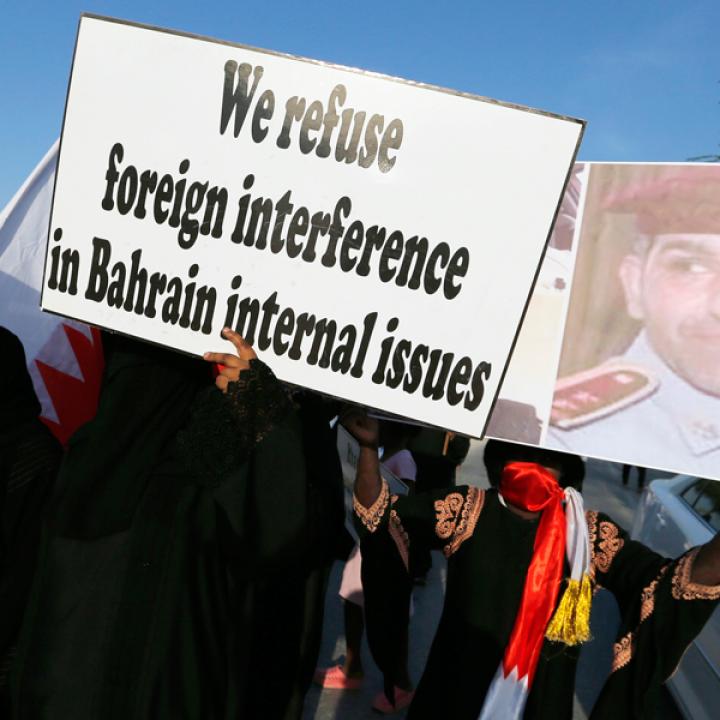
- Policy Analysis
- Policy Alert
Setback in Relations with Bahrain as Senior U.S. Official Expelled

Manama's latest announcement could impact both the island's delicate political process and U.S. military interests in the region.
On Monday, the Bahraini government unexpectedly declared that U.S. diplomat Tom Malinowski -- the State Department's assistant secretary for democracy, human rights, and labor, who had arrived on the island Sunday for a three-day visit -- should leave the country "immediately." The decision likely dislocates carefully planned steps toward fall elections and could affect the operations of the U.S. Fifth Fleet, which is headquartered on the island.
In the official announcement, Malinowski was declared "persona non grata," meaning his diplomatic entry visa was cancelled. Being PNG'ed is rare and typically seems to occur when an intelligence officer operating under diplomatic cover is discovered by the host government. For it to happen between allies -- and to be publicly revealed -- is quite unusual.
As a former Washington director for the NGO Human Rights Watch, Malinowski has a long record of openly criticizing Bahrain -- in 2012, before his appointment to the State Department, he was arrested there while watching a demonstration. Apparently, the particular behavior that Manama found so objectionable this time was his attendance at a Sunday night Ramadan gathering hosted by the main opposition party, al-Wefaq, which is supported by Bahrain's majority Shiite population. It seems he had not held any of his formal meetings with the Bahraini government at that stage.
The island's official news agency reported that Malinowski "intervened flagrantly in Bahrain's internal affairs and held meetings with a particular party to the detriment of other interlocutors, thus discriminating between one people, contravening diplomatic norms, and flouting normal interstate relations." Bahrain's sensitivity may well have been accentuated by a New York Times story this weekend describing the sectarian rift between the island's minority ruling Sunnis and the Shiite population without quoting a single government official.
U.S. policy toward Bahrain has long been torn between concern for economically and politically disadvantaged Shiites and gratitude toward the al-Khalifa ruling family for hosting a major U.S. Navy installation. Since early 2011, when pro-democracy demonstrations were banned, prompting the resignation of al-Wefaq parliamentarians, Washington has been trying to revive the political process in time for elections later this year. A veteran opponent of the al-Khalifas was released from prison in May, and an al-Wefaq leader was acquitted in June of charges related to incitement and advocating terrorism -- the day after a phone call between Vice President Biden and King Hamad in which the former underscored "America's enduring and overlapping interests in Bahrain's security, stability, and reform." Washington, along with the European Union, also promptly condemned last weekend's killing of a Pakistani policeman serving with the Bahraini security forces.
Such moves suggested confidence-building measures intended to encourage al-Wefaq's participation in elections, but they may now be derailed. If so, that could please some factions in Bahrain, including the minority Sunnis who regard their Shiite countrymen -- coreligionists of Iran, 100 miles across the Gulf -- with suspicion. Inside the royal family, Crown Prince Salman and Foreign Minister Sheikh Khalid bin Ahmed al-Khalifa are perceived as supporting reform, though Salman is countered by influential relatives in the military and security services who have pressed the king not to make any concessions to Shiites.
Despite Biden referring to a partnership that has spanned seven decades, recent diplomatic relations were challenging even before this latest incident. A U.S. embassy inspection report leaked in March noted Ambassador Thomas Krajeski's negative image in the (government-controlled) media. It also commented that "public affairs activities suffer from a lack of strategic planning." Krajeski is currently on leave in the United States; in his absence, Malinowski was accompanied to the controversial al-Wefaq reception by the deputy chief of mission and other embassy staff.
Given Bahrain's ongoing Sunni-Shiite tensions and its strategically important location in the Gulf, the island is a key component of U.S. policy discussions on pressing regional issues, including current developments in Iraq, Iran's nuclear program and regional subversion, as well as energy issues. Malinowski's expulsion represents a hugely inconvenient nadir in bilateral relations, which both countries will need to rebuild quickly before the negative consequences spread.
Simon Henderson is the Baker Fellow and director of the Gulf and Energy Policy Program at The Washington Institute.



